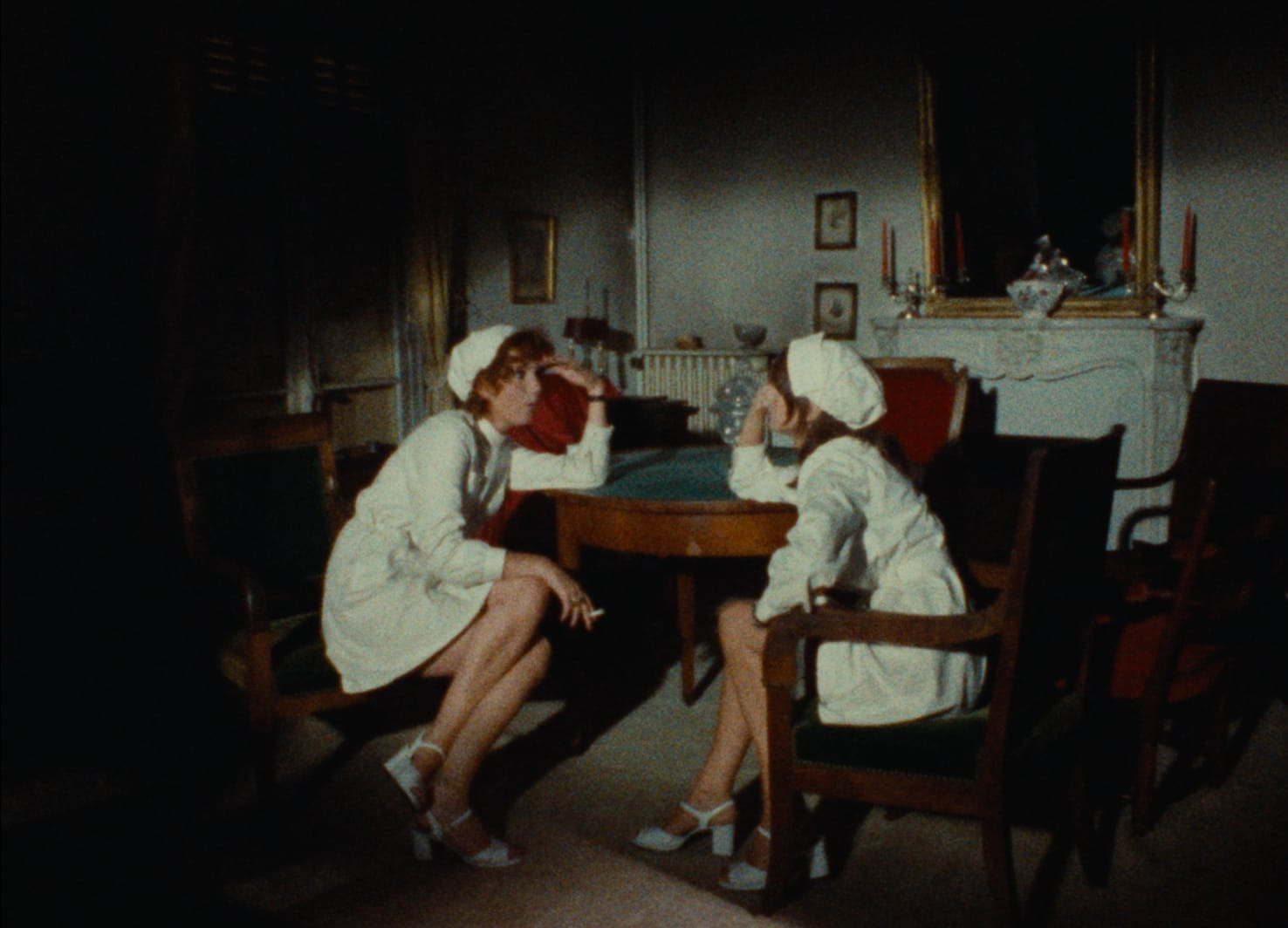“For Rivette, the creative, generative impulse is the stuff of liberation.”
The world of play elaborated by Céline and Julie contrasts sharply with the drama unfolding inside the house of fiction, which sees another pair of women, Camille (Ogier) and Sophie (Pisier), duking it out in a game of subterfuge and manipulation over the affection of a widower named Olivier (Barbet Schroeder, also the film’s producer). These characters wear stuffy formal attire and speak in a stale, sophisticated manner that is dated and rigid in comparison with Céline and Julie’s tank tops, denim, and freewheeling drawls. Per de Gregorio’s suggestion, the melodrama was loosely based on two works by Henry James, The Other House and “The Romance of Certain Old Clothes.” The result is another mocking satire of old-school heterosexual mores, this time laced with simmering dread.
After ingesting the candies, Céline and Julie face the camera, eyes wide and munching on popcorn, as the interior story plays out like a movie being projected, or like a mind-screen made manifest. “Always the same thing,” Julie sighs, recognizing the conventions and overstated flourishes of the penny-dreadful women’s picture, with its stagy theatrics and desperate feminine infighting. Yet the drama, predictable or not, remains engrossing—a testament to the seductive powers of storytelling that relies on formula. There are still gaps in the action, though, and without any candies left, the ladies suit up in roller skates and skintight black costumes (inspired by the character of Irma Vep from Louis Feuillade’s 1915–16 film serial Les vampires) to infiltrate the library by moonlight in search of potion books with recipes for memory retrieval. It’s sort of an inexplicable diversion, considering Julie’s access to the place, yet we relish their escapades and puckish detective work. For Rivette, the appeal of a detective narrative lies not in its eventual resolution but in the very principle of investigation.
The Jamesian melodrama plays like a stumbled-upon theatrical performance, yet clues throughout the film hint at Céline and Julie’s subconscious involvement in the proceedings. There’s a picture of the mansion in a chest Julie owns that also contains dolls and trinkets from her adolescence. Images from both realms mirror each other in uncanny ways: Julie mends Céline’s injured leg at her apartment, and both women, in the role of Nurse Angèle, wash the wound on Camille’s hand; at the burlesque club, Céline wears a thick layer of face cream that resembles the zombiesque face paint that the mansion players put on in the final act. Waiting for Céline to emerge from the house, Julie knocks on a neighbor’s door and has an unexpected reunion with an old woman whom she seems to know intimately—her grandmother, perhaps, or a former nanny. “Do you remember the little girl next door?” asks Julie, possibly referring to Madlyn. “She was my age.” The woman reveals that the family moved away long ago, and that the house has been closed ever since. “Their nurse scared you,” she recalls.
“We must save the kid at all costs,” Julie declares. When she and Céline finally decide to enter the house of fiction together, their unity renders them immune to the mansion’s memory-washing powers. Their plan? Stick to the script, and while one of them plays the predetermined scene, the other will investigate. Naturally, the women fumble their lines, miss their cues, and giggle through the solemn drama. Try as they might, they can’t help but project their games onto the increasingly ghoulish events, transforming the story—and, in the process, themselves, from mere side characters into tangoing, troublemaking detectives.
By means of play, laughter, and friendship, Céline and Julie insert themselves into the text by their own movement, upending a sexist tragedy otherwise seemingly consigned to infinite repetition. In rescuing Madlyn, they actively confront buried traumas, saving themselves from the complacency of passive spectatorship and rejecting the rote performance of femininity that caters to patriarchal desire. Finally, with Madlyn in tow, Céline and Julie go boating. The film’s French title is Céline et Julie vont en bateau—a phrase that carries multiple meanings. They may be taking a trip, in either sense of the word. They may be caught up in telling or listening to a fantastic story. Rivette once called Scheherazade, the storyteller of The Thousand and One Nights, the “patron saint of everyone who tries to play with fiction.” Sentenced to a beheading at dawn, that fabled heroine staves off disaster by captivating the vengeful sultan with stories so incredibly compelling that he eventually, one thousand and one of them later, decides to spare her life. For Rivette, this creative, generative impulse is the stuff of liberation. And so we begin back where we started: the same park, the same bench. Only this time, Céline will chase Julie. The materials do not change, yet the possibilities are infinite, unpredictable, freeing.




